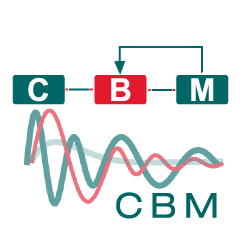
The mission of the Centre for Biological Modelling (CBM) is to support interested EMBL scientists in adopting mathematical modelling techniques, and to foster the interchange of existing modelling expertise throughout EMBL. The services offered by the CBM are open to EMBL scientists of all career levels. Just write me an email or drop by at the Centres Office (Room 118 in Building 1E).
Please use the menu in the right hand side column of the page (scroll down to EMBL CENTRES) to explore the CBM and the different resources.
The CBM provides consultation appointments, performs collaborative modelling tasks, trains EMBL members in relevant programming languages and software tools and will foster collaboration and interactions between EMBL researchers using seminars, journal clubs as well as interdisciplinary retreats.
You have the data and the in depth knowledge of the system you are investigating and you know which question you want to answer. The CBM can provide you with guidance on modelling approaches and tools to support your attempts to answer your questions. Typically questions that can be tackled by modelling are:
- Is your current understanding of the systems mechanisms in accordance with your data?
- If not, what additional mechanism could improve consistency between data and what you believe is the process that leads to these data?
- Given your data, which of your hypotheses on how the components of your system interact is the most likely one?
- What is a quantitative measure of the effect of your exprimental perturbations on your read out?
- Given your knowledge of the system you are studying, are there experiments that make more sense than others?
- Are there any feedback interactions in your system which are not obvious from the schematic representation?
The current expertise of the centre resides in first principles modelling using Ordinary, Random and Stochastic Differential Equations, Constraint-Based Modelling such as Flux Balance Analysis as well as Boolean and Mixture Modelling approaches. Nevertheless, inquiries concerning any kind of modelling are always welcome.
Biological Modelling
In the context of the CBM, a model is in the broadest sense meant as a mathematical representation of the existing knowledge or a hypothesis on a biological system, phenomenon or process. This includes mechanisms like interactions between genes, proteins, cells or other entities that lead to a dynamic behaviour over time, as well as more descriptive concepts like dose response curves and similar input-output relationships.
Models cannot replace experiments. However, the synergistic use of both can foster the understanding of the complex processes in biology. Modelling allows to describe and interpret complex systems where our intuition fails, or is not accurate enough. Our normal way of thinking is mostly sequential and linear, meaning that we think from cause to effect. But in complex systems effects can also feed back to their own causes and that often results in unintuitive behaviour. Since for most questions already a model of some sort exists, for example in form of a cartoon that shows the components and somehow indicates their interaction, sometimes it may only be a small step to translate such a model into a mathematical description.
Models enable hypothesis testing: by comparing how well two different models can explain the data the different hypotheses can be evaluated against each other to decide which one is more likely. Models can aid in generating new insights: if we translate a hypothesis into a model sometimes surprising discrepancies between the simulated model and the real system arise that hint to previously unknown interactions. Such discrepancies often hint to where to have a closer look experimentally. Models deepen our understanding of the system, aid in suggesting and interpreting experiments, are valueable in tracing chains of causation and enable sensitivity analyses.
You need more arguments for why to model? Have a look at:
- Wolkenhauer, Olaf. (2014).Why Model? Frontiers in Physiology, 5.
- Epstein, Joshua M. (2008). Why Model? Journal of Artificial Societies and Social Simulation 11(4)12
Modelling Consulting
The CBM offers modelling consulting. This includes help with the choice of methods, advice on software and troubleshooting and more. Write me an email to request an appointment or come over to room 118.
Modelling activities
See the tabs on the right hand side for more information.
Contact
CBM mailing list
If you want to receive information from the CBM on e.g. upcoming courses and seminars, please subscribe to the CBM mailing list here by checking the box for the CBM.
